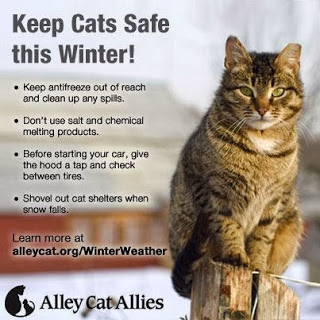

Winter is a time when the temperatures drop and we all have the instinct to hibernate a bit. It is a great time to stay and snuggle with your cat or dog while watching TV or reading a book. You may not want to go out but your dog probably does. Most cats these days are indoor cats but the occasional cat insists on having access to the outdoors. There are a few precautions you can take to keep your pet safe in the winter weather.
If you have your pet in the car keep the heat on. Do not leave a pet unattended in the car for more than 10 minutes if temperatures are below 40F.
If you are walking outdoors try to avoid rock salt as it can irritate your pet’s feet. Use sand or kitty litter on the ice on your own property. Wash feet off after the walk if you are walking your pet on any sidewalks or streets where rock salt is regularly applied. I have purchased winter booties for my dogs but had zero success keeping them on their feet. If you walk takes you near a lake keep your dog off the ice. You don’t want your dog to be the big rescue attempt featured on the evening news. The best leash to use is not that does not extend. A dog can chase a squirrel onto the ice much faster than you can hit the lock button with your thumb.
Flea and tick preventative and heartworm medication must be used monthly throughout the winter. Deer tick nymphs are out in the winter and can attaché to your dog. The later onset of frost and snaps of warm weather during the winter allow mosquitos, the insect that transmits heartworm microfilaria to your dog, to survive longer into the winter. Most heartworm preventatives also worm your dog monthly for intestinal parasites such as roundworm and hookworm that your dog can transmit to you. Your dog sheds the parasites in feces. The eggs live in the soil through deep frost and hot summers for years. The hookworm egg can migrate right through your skin. The roundworm egg must be ingested. These parasites don’t know where to go in the human body so they wander everywhere. Human ophthalmologists have found roundworms in peoples’ eyes.
As a senior veterinary student studying at a bird farm, I worked closely with the family that ran the farm. Their son was 12 years old and was being treated for a brain tumor. They took great care of the birds but I noticed that they did not pick up their dogs’ feces. There were huge bombs of feces all over the property. One day they mentioned that their son had a three-inch serpentine squiggle under his skin on the top of his foot. They had shown it to the doctor and he did not know what it was. They noted that it was now moving up his foot. Having just finished my parasitology course I let them know I thought it was a migrating hookworm larva but that they should speak to their doctor again. They treated him for the hookworm and the squiggle on his foot went away. Years later they called me about a bird in my practice. I was hesitant to ask if their son had survived his brain tumor. He survived and thrived.
If you want more information on pet parasites to visit the Companion Animal Parasite Council. http://www.capcvet.org/
Find a winter coat for your pet especially if the fur is short or your pet is very small or very old. Winter coats come in all sorts of styles and will add an extra layer of protection from the biting cold and wind.
If you have an outdoor cat make sure they are let in on a regular basis and kept in at night. Coyotes have devoured several cats in North Salem during the past year. I have observed foxes stalking cat at Salem Willows and in my own backyard in North Salem. Do not let your cat or dog out in heavy snowfall or when the snow is more than 8 inches deep. During the multiple blizzards in 2011 people lost their cats. Some were later found plowed into snow banks or just buried in snowdrifts. They did not make it out alive. Even a large dog can be lost in a snow bank or hit by a plow. Keep close track of your pets in these storms. They should be observed every minute they are outdoors and should be out no more than 10 minutes in freezing weather.
Antifreeze spilled during a top off of the tank can taste sweet to a cat or dog. As soon as even a teaspoon it is ingested it starts to damage the kidneys. If you know or suspect that your pet has ingested antifreeze please call your veterinarian immediately. If you wait kidney failure can ensue within a couple days and you could lose your pet.
Enjoy your times of hibernation with your pet and then get out there and give them some much-needed exercise and airing out. You’ll feel great after the fresh air and exercise.








